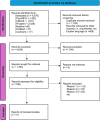Quality of Nursing Care: Addressing Sexuality as Part of Prostate Cancer Management, an Umbrella Review
- PMID: 39788557
- PMCID: PMC12271653
- DOI: 10.1111/jan.16703
Quality of Nursing Care: Addressing Sexuality as Part of Prostate Cancer Management, an Umbrella Review
Abstract
Background: Sexuality is a fundamental aspect of health and wellbeing. The management of prostate cancer can result in erectile dysfunction and body feminisation, resulting in loss of masculinity and alterations of body image. Prostate cancer patients identify sexuality as an unmet need and report little or no communication with their healthcare providers on the topic.
Aim: This umbrella review aims to determine the barriers that may preclude nurses from discussing sexuality with prostate cancer patients.
Design: An umbrella review of systematic review studies was undertaken using the PRISMA guidelines.
Method: Five databases were comprehensively searched, CINAHL, MEDLINE, PsycINFO, Cochrane and Prospero, from October 1, 2013 to December 1, 2023, using the defined criteria. A total of 11 systematic reviews were included in this review consisting of 10 with quantitative and 1 with quantitative/mixed methods approach.
Results: This study identified common themes, which were categorised into four groups: (a) lack of training and education, (b) age and years of clinical experience of nurses, (c) personal values and attitudes and (d) organisational factors. These factors contribute to why nurses feel unprepared and admit to not having adequate knowledge or expertise to have this discussion.
Conclusion: The findings of this study illustrate that nurses require specialised communication skills to manage sensitive discussion with patients. Education is crucial to facilitate and empower nurses to discuss sexuality with their patients. Developing a pathway to specialist referrals will encourage nurses to address this with their patients.
No patient or public contribution: For the preparation of this paper, no direct involvement of patients or public has been deemed applicable to this work. This is an umbrella review paper.
Keywords: barriers; nursing; prostate cancer; quality care; sexuality.
© 2025 The Author(s). Journal of Advanced Nursing published by John Wiley & Sons Ltd.
Conflict of interest statement
The authors declare no conflicts of interest.
Similar articles
-
Health professionals' experience of teamwork education in acute hospital settings: a systematic review of qualitative literature.JBI Database System Rev Implement Rep. 2016 Apr;14(4):96-137. doi: 10.11124/JBISRIR-2016-1843. JBI Database System Rev Implement Rep. 2016. PMID: 27532314
-
Experiences of registered nurses as managers and leaders in residential aged care facilities: a systematic review.Int J Evid Based Healthc. 2011 Dec;9(4):388-402. doi: 10.1111/j.1744-1609.2011.00239.x. Int J Evid Based Healthc. 2011. PMID: 22093388
-
Experiences of gynecological cancer patients receiving care from specialist nurses: a qualitative systematic review.JBI Database System Rev Implement Rep. 2017 Aug;15(8):2087-2112. doi: 10.11124/JBISRIR-2016-003126. JBI Database System Rev Implement Rep. 2017. PMID: 28800057
-
[Volume and health outcomes: evidence from systematic reviews and from evaluation of Italian hospital data].Epidemiol Prev. 2013 Mar-Jun;37(2-3 Suppl 2):1-100. Epidemiol Prev. 2013. PMID: 23851286 Italian.
-
Transition of care for adolescents from paediatric services to adult health services.Cochrane Database Syst Rev. 2016 Apr 29;4(4):CD009794. doi: 10.1002/14651858.CD009794.pub2. Cochrane Database Syst Rev. 2016. PMID: 27128768 Free PMC article.
References
-
- Akers, J. 2009. Systematic Reviews: CRD's Guidance for Undertaking Reviews in Healthcare. York: CRD, University of York.
-
- Allemani, C. , Weir H., Carreira H., et al. 2015. “Global Surveillance of Cancer Survival 1995‐2009: Analysis of Individual Data for 25,676,887 Patients From 279 Population‐Based Registries in 67 Countries (CONCORD‐2).” Lancet 385, no. 9972: 977–1010. 10.1016/S0140-6736(14)62038-9. - DOI - PMC - PubMed
-
- Almont, T. , Farsi F., Krakowski I., El Osta R., Bondil P., and Huyghe E.. 2019. “Sexual Health in Cancer: The Results of a Survey Exploring Practices, Attitudes, Knowledge, Communication, and Professional Interactions in Oncology Healthcare Providers.” Supportive Care in Cancer 27: 887–894. 10.1007/s00520-018-4376-x. - DOI - PubMed
Publication types
MeSH terms
LinkOut - more resources
Full Text Sources
Medical


